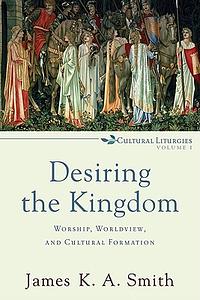You need to sign in or sign up before continuing.
Take a photo of a barcode or cover
Worth reading but a bit disappointing
Perhaps this review is colored by having read many other of Smith's works, and hearing him talk in person, but I did not find that this book had a lot to contribute on its own. His ideas are repeated many times in his other books, and even within this one alone. I think it is a good introductory to his thought, however, and it's a better read for those without a background in philosophy, but is ok to skip and read the others in his cultural liturgies collection instead
Perhaps this review is colored by having read many other of Smith's works, and hearing him talk in person, but I did not find that this book had a lot to contribute on its own. His ideas are repeated many times in his other books, and even within this one alone. I think it is a good introductory to his thought, however, and it's a better read for those without a background in philosophy, but is ok to skip and read the others in his cultural liturgies collection instead
Quite possibly the best book on worship and formation I have ever read. Fantastic.
Love the main idea of this book - that worship and education have been stuck in passing on information. Instead the point of worship is the creation of a "peculiar people", to cultivate a new trajectory for a community, i.e. oriented towards and desiring the Kingdom of God.
Where it falls short is imagining (beyond traditional forms) what worship oriented this way would look like. The assumption that classical worship is sufficient for creating this particular people. Which may be true, but I'm interested in seeing whether a new imagination of worship would result in different approaches.
Where it falls short is imagining (beyond traditional forms) what worship oriented this way would look like. The assumption that classical worship is sufficient for creating this particular people. Which may be true, but I'm interested in seeing whether a new imagination of worship would result in different approaches.
Helpful corrective to an over-cerebral approach to the Christian faith and a good reminder that we are also affective beings. But I believe he overemphasizes this point. Not only this, but a priority on the affective (loves, desires, motivations, etc.) as foundational for change of mind requires that we first settle on (a work of the mind) on what to aim for in our desires. As noted by my professor in class discussions, absent from the book is a treatment of sin. For a book on how we as believers are to live in this world, this is a significant omission.
The growing trend of implementing various philosophical and theological approaches using the developmental aim of "Spiritual Formation" is becoming much more popular as people desire to connect that which is ancient and apply into our modern context. This is most evident in the arena of human development and the relationship between cognitive development and the relationship it has with spiritual maturity. In simplicity the debate is focused on the one side an education based on an Informational Model that focuses on that which cognitive in contrast to what is being presented as a Formational model that attempts to integrate that which is both cognitive and that which shapes the "kardia" or heart of a person. Thus, within the Christian community the entry point into the discussion begins with developing a perspective concerning the nature of man in relationship with his Creator. It is in this matrix that present day scholars perceive Spiritual Formation as being profoundly social. For instance, Dallas Willard states, "For all that is between me and God affects who I am; and that, in turn, modifies my relationship to everyone around me." He goes on to write, "My relationship to others also modifies me and deeply affects my relationship to God. Hence those relationships must be transformed if I am to be transformed." It is in addressing the modern debate of how people are formed in Christian Education that James K.A. Smith, in his book Desiring the Kingdom: Worship, Worldview and Cultural Formation, the first of a three volume set states, " If we consider these two very different understandings of education (the informative and the formative, and the different understandings of the human person that are at work behind them, I suggest that, over the past decades, institutions of Christian Education have unwittingly absorbed the former and eschewed the latter. Many Christian schools, colleges, and universities - particularly in the Protestant tradition - have taken on board a picture of the human person that owes more to modernity and the Enlightenment than it does to the holistic, biblical vision of human persons." It is in response to this issue that James K. A. Smith presents that most Protestant Christian Education has absorbed philosophical anthropology that sees human persons as primarily thinking things which then promotes and understanding of education largely in terms of information which makes its end the dissemination and communication of Christian ideas rather than the formation of a peculiar people. It is in light of this understanding that the author presents that this now manifested in the way the vision of Christian Education is articulated in the terms of "a Christian worldview." It is then important to understand that the author is in no way avoiding the foundation of theological expression for a more social anthropological perspective but is in fact using anthropology as one of the sectional disciplines of theology to present his thesis concerning man created in the Image of God (imago dei), as a calling to a Mission that only man is the steward of in all of creation. There are some researchers that affirm that because the concept of imago Dei in the New Testament is not only anthropological but Christological and soteriological that the only way to bridge that which is held precious to man in terms of belief with that which is cognitive in the holistic formation of people that only theology can provide a more complete portrait of the formation of people in their humanness. Thus, there can be critique that Smith's discussion concerning worldview with the employment of counter-anthropology which can be understood in Smith's question: "What if education wasn't first and foremost about what we know, but about what we love?" The argument that Smith presents is that we have an anemic vision of the human person because we treat them more as thinkers or believers rather than lovers. It is with this statement of the author defaulting to a more philosophical anthropology that criticism could be levied that he does not engage this topic theologically. It is the humble opinion of this student that though Smith's vision would offer theologian's much to think about in terms of Christian Education his use of the word telos in from the perspective of philosophical anthropology will not be theologically substantive enough to meet the depth of understanding from the areas of Christian Theology such as the ontological study of God, or Christology and Pneumatology. Smith's theological thought I think will be considered underdeveloped. It is my presentation of Smith's philosophical anthropology that the discussion of man being created in the image of God becomes the foundation for Smith to argue that man primarily was made to worship and being created in the image of God is not a thing but rather a calling and vocation. It is here that I would argue that though Smith is not approaching this subject on the basis of a systematic theology in which each one of sections of discipline is being presented in an organized fashion neither do I not perceive Smith avoiding the topics in these areas of discipline. Matter of fact, if you were to review the four approaches of understanding imago Dei: (1) First, the moral characteristics inside of man; (2) Second, a functional view, identifying the God-ordained purpose and work specific to humans; (3) Third, a relational view that sees it as man's social and relational capacity; (4) Fourth, a teleological view suggesting it is reflective of the ultimate objective of human existence. Smith attempts to not present these topics in pieces, but instead, present it in the historical event of God breaking into human history with the establishment of His Kingdom. Thus, we are fully created in God's image with a calling that is found in the person of Christ and his vocation who modeled how to live in the kingdom. Simply our doing flows out of our being and what we have loved is what we will become. It is my assumption that Smith would agree with the assessment of Greg R. Allison of the Southern Baptist Theological Seminary when discussing imago Dei not being understood in separate parts like a jigsaw puzzle but rather in our humanness we are constructed holistically that in our entirety are created in the image of God.
Therefore, Smith contextualizes man being created in the image of God using the language of George Eldon Ladd's description of the present "in between times" of the kingdom of God being the now but the not yet. This was central to the calling of Jesus of being the fullness of the image of God, thus accomplishing that creational task that was given to Adam which all is made complete by act and liturgy that the Cross represents (this students language not the author's). This finds its foundation in the use of the word liturgy. For the author, there are both "sacred" and "secular" liturgies at work that are attempting to grip the affection of humanity. The sacred makes the unfortunate attempt of seeking people's hearts by lecturing them, while the secular grasps at desiring humanity where they desire - their loves. The foundational thought for Smith is that liturgies form our most fundamental desires and our most basic attunement to the world. The manifestation of ultimate love using the vehicle of liturgy is that humanity worships which is not always what we are thinking. What Smith attempts to do is to present that what man desires is ultimately transcendent and using the cognitive approach of "Worldview" what inherently occurs is that people no longer live as eschatological beings in the immediate present but instead are always out of step with the times they live in never connecting with that which would truly form them. For Smith to really live as one who is being formed into Christ it is necessary to practice in our liturgy our personal confession to be completely dependent on God.
Conclusion:
I enjoyed reading Smith's book and feel that his attempt of use of philosophical anthropology will receive criticism from those of the theological community for not being more robust in its breadth. I also struggled with Smith's use of Aristotle when discussing habits, because virtue is defined as doing the right thing without having to think about it. Therefore, he sets forth by use of the imaginative are more non-cognitive approach to the implementation of what we believe. I think there are some other theologians throughout history that would have given a more balanced perspective of anthropology than the citing of Aristotle. The positive element that Smith attempts to do in this volume is harmonize how the Kingdom of God sets forth a whole new telos that not only engages the mind (though Smith for me goes too far in his presentation of minimizing the cognitive), and involves in the engaging of the passion of people the fact that he does not broaden his argument to engage other areas of discipline within a theological framework leaves me wondering if he develops this further in the next two volumes.
challenging
informative
reflective
slow-paced
If I could give this book 6 stars I would. It came along at the perfect time for me. I can't recommend it enough.
challenging
informative
reflective
slow-paced
Written for an academic audience but I found it fascinating. Thought this was headed for a 5-star review but the quality tailed off in last two chapters. Still, eagerly looking forward to reading the next volume in this series, *Imagining the Kingdom*.


